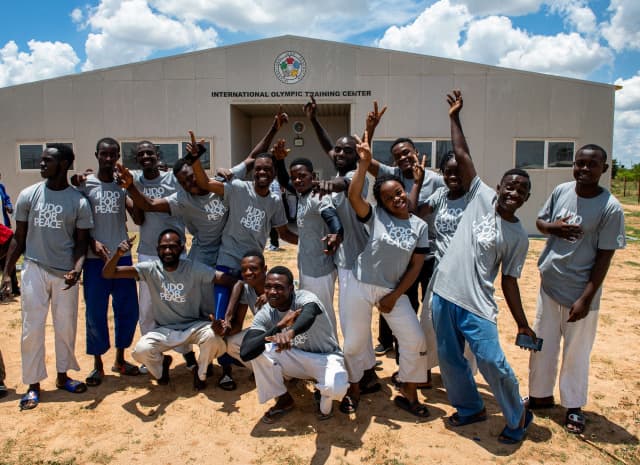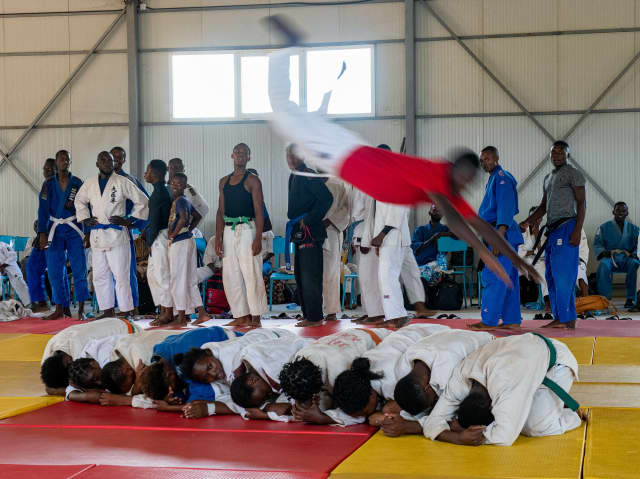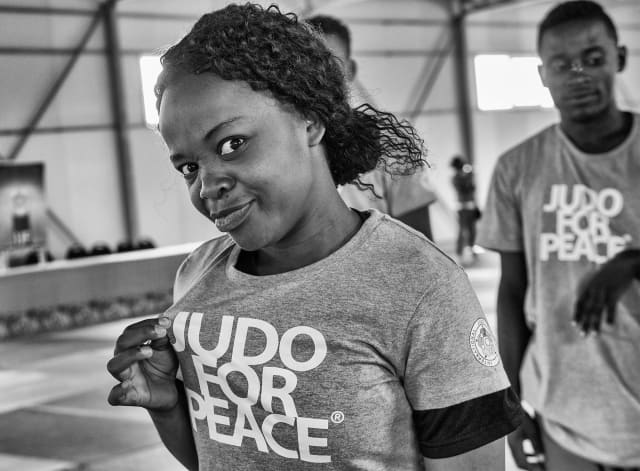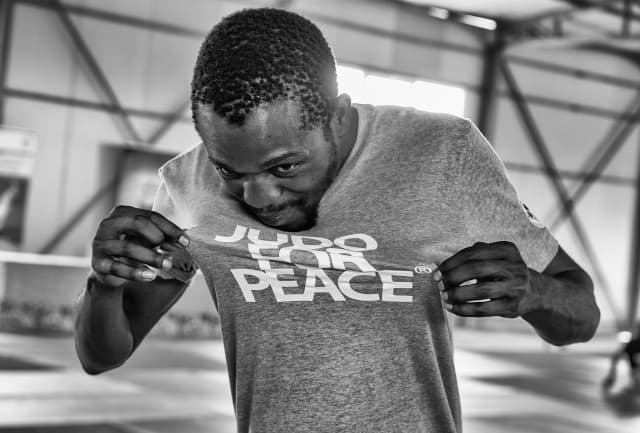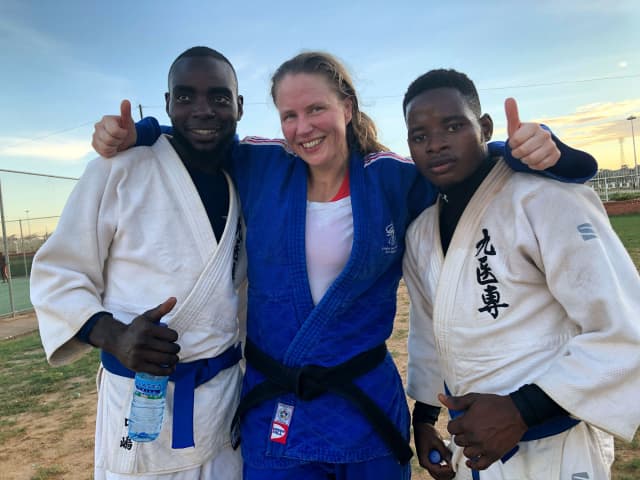According to the UNHCR, today more than 70 million uprooted people in the world are in this situation. 70 million is more than the number of inhabitants of a country like France, not less.
Among the countries most affected by this permanent exodus are the African countries. Whether for economic or political reasons, millions of penniless people find themselves wandering for weeks, even years, in often dramatic living conditions. Many of them are stranded in refugee camps, far from the idea of a better life they could dream of.
Meheba, Zambia, and Dzaleka, Malawi, are two emblematic examples of these places, all too often forgotten, where thousands of refugees live after weeks of dangerous wandering.
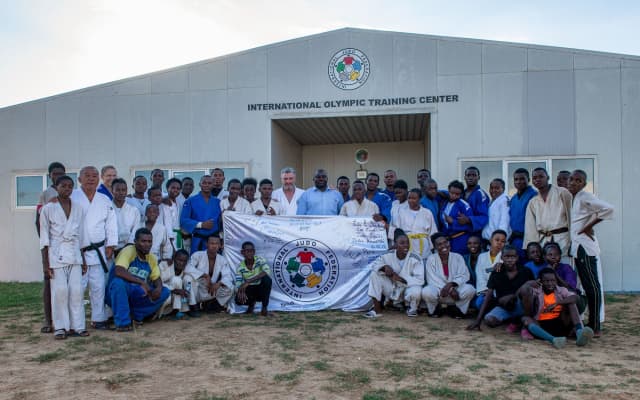
As of November 2016, the International Judo Federation, in partnership with the Zambian Judo Association, officially launched a Judo for Peace programme in Meheba. Very quickly, the Judo for Fred Committee (Norway) and the Norwegian National Olympic Committee (NIF) joined the IJF and ZJA in the project. The highlight was the inauguration of a dojo, in the heart of Meheba in December 2018 (https://www.ijf.org/news/show/new-home-for-refugees-in-meheba-zambia) financed by NIF.
In February 2018, it was the turn of the Dzaleka camp a few dozen kilometers from Lilongwe, the capital of Malawi, to open its doors to judo. Since their launch, these two Judo for Refugees programmes have been developing continuously, offering an educational alternative to the youth massively present in the camps, and finally allowing them to dream of better days. In Meheba for example, if the programme was launched with about fifteen judoka under the direction of Faustin, a refugee himself, today there are nearly 250 young people who can practice judo daily. At Dzaelak they are now 150.
At the end of November, a selection of judoka from Meheba and Dzaleka met on the tatami of the Judo National Training Center (financed and built by the IJF) in OYDC in Lusaka for a seminar led by Nicolas Messner, IJF Judo for Peace Director, in collaboration with the Judo for Fred committee (JFF - Norway) led by Birgit Ryningen.
The latter said: "It is important for JFF to be involved in the refugee program because they have nothing and they are forgotten. They have fled their homes and lost everything. In Zambia they found safety, but their lives are on hold. They are only allowed to exist and no one knows for how long. Most of them stay in the refugee settlement for several years. The settlements have, not really surprisingly, challenges with violence and alcohol. It is obvious that we should support their judo activity. Not supporting them is really not an option. "
She added: “Personally I really like meeting the refugees. On the tatami we are equals. It is so easy for us to think about refugees as ‘them', implying that we are different, but we are not. We are all the same and we cherish the same value. It reminds me that we are not allowed to not care or we shouldn't forget them. They are part of our judo family. We have a very good cooperation with the Zambian Judo Federation. They are the ones who does most of the work on ground. We work together with a common goal and it is easy to cooperate when we are pulling in the same direction.“
The fact is that the cooperation is very effective thanks to the hard work of the people on the ground. Alfred Foloko, President of ZJA and of the NOC said: “The people of Zambia are very peaceful and generous. On many occasions our government has reaffirmed its commitment to continue giving a wholesome life to refugees without discrimination and without living anyone behind. Zambia is embracing the global issue of refugees and we want to make everything possible to ensure sustainable solutions for refugees, former refugees and host communities in a holistic manner. As am also the president of the judo Region (Southern African countries), I want to underline that we will do everything possible to support our brothers and sisters who live a difficult situation here in Zambia, but also in Malawi, Zimbabwe and any other places.“
One must have seen the smiles exchanged on the tatami at the OYDC during the seminar and the friendship shared by judoka coming from different horizons to realize that the words of President Foloko are not empty shells. This type of regrouping is a request from the refugees: "We need exchanges like these. It is important that we can meet and share moments of friendship that make us feel good", said Faustin, the Meheba coach.
Osbourne Banda, General Secretary of the Malawi Judo Federation, who was accompanying the delegation said: “We have travelled by road all the way from Lilongwe to Lusaka meet our friends from Mehaba. We also want to invite them to come and visit us in Malawi. This programme is important for us, but beyond that, for everyone in our countries. We are building friendship. We can not leave anyone on the side of the road. We hope that we will be able to have more training camps like this one in the future and maybe one day, one of our athletes will also participated in the World Judo Tour.“
There are still challenges to solve and the partnership between all the stakeholders (IJF, ZJA, NIF, JFF, UNHCR...) will help to find the best solutions: “In Dzaleka we don't have a dojo dedicated to judo yet. We have to move the tatami regularly. We are also lacking judogi. We really want to have a place for our judoka. But our passion for the sport is very high. We have created a programme called 'Judo for Hope', and with that we want to invest in schools and help people with special needs“, explained Boniface, the Judo for Peace programme secretary general in Dzaleka.
Because he likes to be concrete and help the judo community, Alfred Foloko concluded: “Next year, I want our refugees to meet in Malawi with people coming from the whole region. My dream is that in the upcoming years, we have 10,000 children practicing judo in Meheba and that all schools can take part. With NIF and JFF, we will also work on providing a coach to the camp and I want this coach to be a woman so we can really promote our sport among the women's community, which is a priority.“
For a few days, those who left everything behind them, found the ideal conditions to hope for a brighter future. Building together, moving forward hand in hand, this is the most cherished wish of all participants. Nothing will be easy, nothing is written in advance, but certainly, the will to advance is present in minds and hearts.

